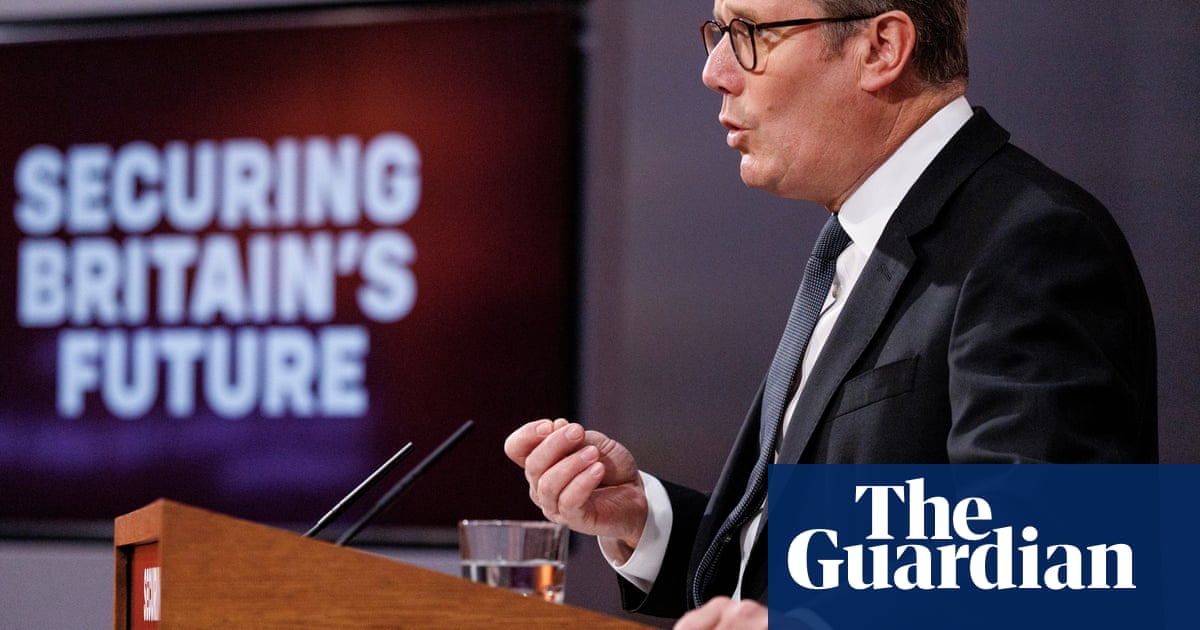“We must never accept the Tory or media narrative that often scapegoats and demonises migrants,”Keir Starmerwrote in 2020. “Problems of low pay, housing and public services are not caused by migrants – they are caused by a failed economic model.”
Much has changed since Starmer was running to be leader of theLabourparty – not least, that as prime minister he now has a broader electorate to keep on side.
His aides argue he has long made the case for tougher rules on immigration, but the rise of Reform UK, and Nigel Farage’s success among voters disillusioned with the political mainstream, has added a new political imperative.
Announcing his new immigration policies on Monday, Starmer warned that the UK risked becoming an “island of strangers” without a tougher approach, and said the government would “take back control of our borders” and close the book on a “squalid chapter” of rising inward migration.
For those who believe that he has already pitched too far to the right in response to the rise in support for Reform UK, his rhetoric on immigration will bite.
Sarah Owen, the Labour MP for Luton North who is on the soft left of the party, said the best way to avoid the UK becoming an “island of strangers” was to invest in communities so that they thrived.
“I’ve said it before and will say it again: chasing the tail of the right risks taking our country down a very dark path,” she warned, urging the government not to risk pitting people against each other.
Nadia Whittome, the Labour MP for Nottingham East, said: “The step-up in anti-migrant rhetoric from the government is shameful and dangerous.
“Migrants are our neighbours, friends and family. To suggest that Britain risks becoming ‘an island of strangers’ because of immigration mimics the scaremongering of the far right.”
Others went further. Zarah Sultana, an independent MP since she was suspended from Labour for voting to scrap the two-child benefit cap, accused Starmer of imitating Enoch Powell’s infamous “rivers of blood” speech.
Downing Street insiders, however, reject the criticism, insisting the prime minister understands that immigration is part of Britain’s national story, but that he believes more control is needed and there should be higher expectations for people arriving in the UK to integrate.
Aides point to focus groups which show that voters worry about the scale of net migration – which soared to more than 900,000 under the previous Conservative government – and the impact on community cohesion in particular.
“The truth is that people are really concerned with high levels of immigration and we want to make the system fairer,” a No 10 source said. The issue is particularly salient among Labour voters who have shifted to Reform.
Labour aides say the government is motivated by how the public feels about immigration. But they also know their electoral fate depends, in part, on whether they can bring numbers dramatically down. Net migration was 728,000 in the 12 months to June 2024.
Official estimates by the Home Office show that under the new immigration approach, there could be 100,000 fewer people entering the UK every year. The projections suggest net migration could fall as low as 300,000 by 2029.
Starmer, however, has avoided chasing what he has described as “arbitrary, unenforceable and unachievable” targets. But he does not only have to make the case for driving down the numbers to those on the left.
He also has to convince employers who are arguing that immigration policy is preventing businesses from accessing critical skills to deliver investment, putting jobs and growth at risk.
Rachel Reeves is on hand to help. On a trip to Washington in May 2023, she made a speech setting out a British version of Bidenomics, echoing the former US president’s language on economic nationalism.
Since then, Reeves – now the chancellor – has repeatedly focused on the need for businesses to invest in the domestic workforce, rather than relying on cheap labour from abroad.
On Monday, Starmer explicitly made the case that higher levels of immigration – particularly by low-skilled workers – were not in fact contributing to economic growth. “That link doesn’t hold,” he told reporters.
No 10 officials are expected to ask the Office for Budget Responsibility, which now regards migration as a net positive to the economy over a five-year period, to look again at how it reaches its conclusions.
“Their calculations don’t take the longer term costs to communities into account, when people start ageing and relying on the state more,” one said. “We’re all taking immigration and its impact on the economy seriously.”
